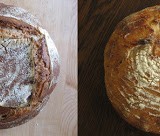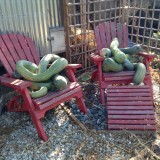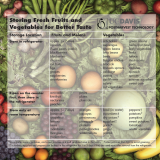
Dave Miller at work. Photo by Josey Baker.
The highlight of the National Heirloom Expo, for me, was running into three people who epitomize the value of dedication to a craft.
I’ve found that such craftspersons keep no secrets and are more than happy talk about techniques and tips. They are also, according to Matthew Crawford, an antidote to our culture’s narcissism. Crawford says, in his book Shop Class as Soulcraft: An Inquiry Into the Value of Work,
The moral significance of work that grapples with material things may lie in the simple fact that such things lie outside the self. A washing machine, for example, surely exists to serve our needs, but in contending with one that is broken, you have to ask what it needs. At such a moment, technology is no longer a means by which our mastery of the world is extended, but an affront to our usual self-absorption. Constantly seeking self-affirmation, the narcissist views everything as an extension of his will, and therefore has only a tenuous grasp on the world of objects as something independent. He is prone to magical thinking and delusions of omnipotence. A repairman, on the other hand, puts himself in the service of others, and fixes the things they depend on. His relationship to objects enacts a more solid sort of command, based on real understanding. For this very reason, his work also chastens the easy fantasy of mastery that permeates modern culture. The repairman has to begin each job by getting outside his own head and noticing things; he has to look carefully and listen to the ailing machine.
The trio of craftspersons I ran into at the expo included a baker, a tomato farmer and a nursery owner. They share common qualities: humility, openness and an attention to detail.
The baker is Dave Miller who I helped bring to LA to teach a series of classes. Miller specializes in whole grain breads made from freshly milled local grain. Most “whole grain” loaves baked in this country are actually white flour with food coloring, sugar and a small amount of stale whole grain flour. Miller can turn wet, sticky whole grain lumps into perfectly formed, airy loaves with one deft flick of the wrist. He has the skill to build an empire the size of La Brea Bakery but is happy working at a smaller scale selling loaves at the Chico farmer’s market once a week. I think he’s the most talented baker in the U.S.
I also ran into tomato farmer and breeder Fred Hempel who was a guest on episode 79 of our podcast. Like Miller, Hempel has a humility that goes along with a sincere engagement with the natural world. Like Miller he’s more than happy to discuss his craft.
A third person I met at the festival is Alice Doyle, owner of Log House Plants a wholesale nursery in Eugene Oregon. In her lecture she went alphabetically through a list of edible plants she thought were interesting. By the end of the hour, I think she reached the letter “J.” I wished we could have had a few more hours to get to “Z.” And this is another quality of the craftsperson, a selfless enthusiasm that can turn a list of vegetables into something way more interesting than what passes for entertainment in our culture. I’ll see if I can get Doyle on the podcast.
We are, I think, entering a dangerous new age of extreme narcissism fueled, in part, by Silicon Valley tech bros who have figured out a business model based on self-affirmation. We need more people like Miller, Hempel and Doyle.
Support Root Simple

Pawpaw: In Search of America’s Forgotten Fruit. The largest edible fruit native to the United States tastes like a cross between a banana and a mango. It grows wild in twenty-six states, gracing Eastern forests each fall with sweet-smelling, tropical-flavored abundance. Historically, it fed and sustained Native Americans and European explorers, presidents, and enslaved African Americans, inspiring folk songs, poetry, and scores of place names from Georgia to Illinois. Its trees are an organic grower’s dream, requiring no pesticides or herbicides to thrive, and containing compounds that are among the most potent anticancer agents yet discovered.




